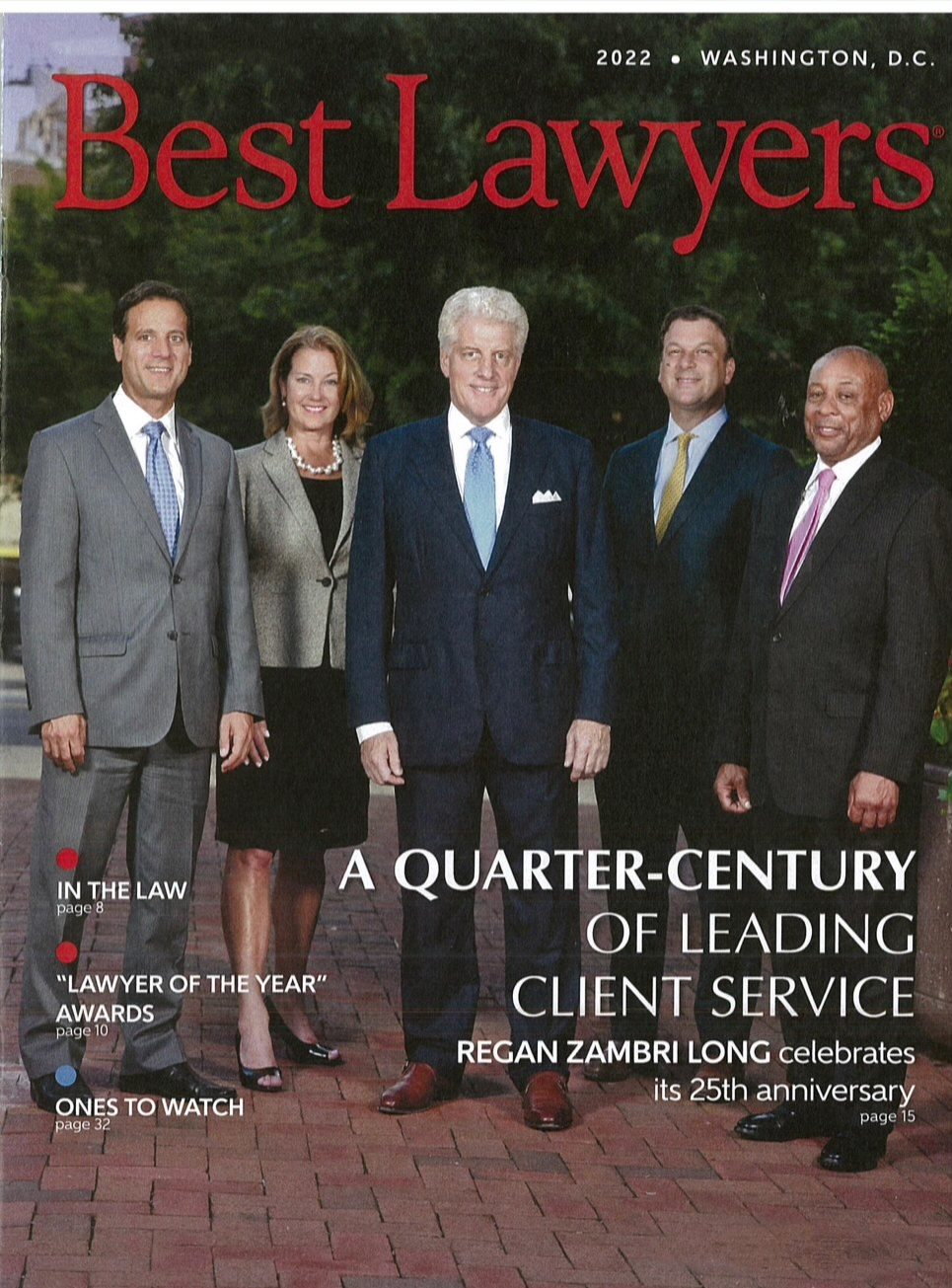Our experienced civil rights lawyers in Washington, DC, are committed to protecting your fundamental Constitutional rights and holding powerful institutions accountable. With decades of experience litigating complex civil rights cases in our nation’s capital, we fight tirelessly against discrimination, police misconduct, and violations of constitutional freedoms.
Our attorneys leverage their deep understanding of federal civil rights laws and proximity to key government institutions to represent clients whose rights have been violated effectively. Our team has the expertise and resources to pursue justice on your behalf. Contact Regan Zambri Long today to schedule a free consultation.
Contact Us Today to Schedule
A Free Consultation
Civil rights lawsuits can be quite complicated to prove. While you are not required to have legal counsel by your side, hiring a civil rights lawyer is always in your best interest. According to its annual report, the DC Office of Human Rights received 1,222 initial violation complaints in 2023. A skilled DC attorney will know the steps to file your complaint and lawsuit. The team at Regan Zambri Long will pursue justice until a settlement or verdict is secured in your favor.
Your civil rights lawyer will:
It is normal to be overwhelmed by a civil rights violation. When you are unsure where to turn, turn to Regan Zambri Long. Our Washington, DC, civil rights lawyers know the district’s laws inside and out. Our legal team will ensure the liable party is held accountable for the harm they caused you. Schedule your free case evaluation today and take the first step toward the justice you deserve.

The DC Human Rights Act protects citizens based on 23 traits and prohibits discrimination in housing, employment, public accommodations, and education institutions. Washington, DC’s protected traits include:
Though many people use civil rights and civil liberties interchangeably, they have legal differences. Civil liberties are basic freedoms guaranteed by the United States Constitution, such as freedom of speech, to protect U.S. citizens from a tyrannical government. Civil rights are legal rights that protect you from unfair treatment and discrimination. Civil rights generally include housing, education, employment, and accessibility.
For example, marriage is a civil liberty protected by the Constitution. Same-sex marriage is a civil right. Same-sex couples were not allowed to marry until 2015, when the U.S. Supreme Court ruled that a marriage license could not be denied to LGBTQ+ couples. Therefore, if you are denied a marriage license because the clerk decides not to issue any marriage licenses, you are being denied your civil liberty. If the clerk denies a marriage license because you are part of an LGBTQ+ couple, you are being denied your civil rights.
Any targeted discrimination requires legal action. Although a civil rights suit can be overwhelming, Regan Zambri Long will shoulder the legal burden for you. Call us today for a free consultation.
Civil rights are often violated when a person or organization makes an assumption based on one of the protected traits. In some cases, discrimination is against a trait. In other cases, discrimination may be in the form of prioritizing another trait. In either case, it is wrong, and you should consult a legal expert. Some common cases of discrimination include:
Workplace discrimination: Workplace discrimination is a large umbrella and can take on many forms. Everyone is entitled to a safe working environment regardless of race, religion, gender, or age. If your civil rights were violated in your place of work, contact a civil rights lawyer today.
Voting discrimination: The Voting Rights Act of 1965 ensures that states and localities cannot block citizens from voting. The law was enacted after the civil rights march in Selma, Alabama. While states historically used laws to prevent minorities from voting, the Voting Rights Act of 1965 protects the voting rights of all U.S. citizens, regardless of skin color or language barriers. If you are denied your right to vote, you need to contact a DC civil rights lawyer at Regan Zambri Long immediately.
Housing discrimination: The Fair Housing Act prohibits discrimination from direct housing providers such as landlords, realtors, banks, lending institutions, and homeowner’s insurance companies. The act also extends to renters and buyers with service animals. A landlord or seller cannot deny the sale or rent of housing if the person has an assistance animal to alleviate the effects of a disability. If you are denied housing based on any of DC’s protected characteristics, you should meet with a Regan Zambri Long attorney to discuss your legal options.
Justice system discrimination: While police officers have the right, as part of their job, to use force when necessary, excessive force is a violation of your civil rights. The Eighth Amendment protects American citizens from the use of excessive force and from cruel and unusual punishment. Police officers have the duty to act in good faith when using force on citizens Additionally, the American judicial system cannot discriminate against DC’s protected characteristics. Regan Zambri Long’s DC civil rights attorneys can make sure you are protected from the flaws in the system. Schedule a consultation with an attorney today.
Public accommodation discrimination: Federal law does not allow facilities that offer food, lodging, gasoline, or entertainment to discriminate against anyone based on race, color, religion, or national origin. The 23 protected characteristics, as written in the DC Human Rights Act, are also protected in public accommodations. The Americans with Disabilities Act ensures equal opportunities for people with disabilities to access transportation, public accommodations, and employment. Public accommodations – even privately held businesses that are open to the public – must provide ample accessibility to people with disabilities.
Discrimination comes in many forms, sometimes intentional and other times not. But even if an entity is not intentionally discriminating against you, the effects are still harmful. Regan Zambri Long will ensure they are held accountable for their actions. Schedule a free case evaluation today to discuss your legal options and next steps.
For many civil rights cases, money cannot compensate for your pain. Seeking compensation may feel like trivializing the harm done to you. However, the American civil justice system works to monetize your damages. With this in mind, your Regan Zambri Long civil rights attorney will pursue the following forms of compensation for your case:
Valuing a discrimination claim is challenging, but you don’t have to attempt it alone. Schedule a free case evaluation with Regan Zambri Long’s DC civil rights lawyers to discuss how much your case may be worth.

The Regan Zambri Long civil rights attorneys work on a contingency basis. This means your lawyer will not charge you an upfront fee for their services. Rather, you will only pay your civil rights attorney if they recover damages for you in your case. In many cases, your lawyer will work in legal fees to the damages being pursued in your case. Contact the Regan Zambri Long personal injury lawyers today to discuss your claim and legal strategy to win a favorable verdict.
The Office of Human Rights (OHR) is the Washington, D.C. task force that seeks to eradicate discrimination and protect human rights for DC residents. It’s important to note that you don’t have to be a Washington, DC resident to file a civil rights violation complaint with OHR, but the alleged discrimination must have occurred in DC to file a complaint. If you believe you’ve been discriminated against based on the 21 protected characteristics in DC, then your Regan Zambri Long civil rights attorney will file a complaint with OHR.
Certain types of civil rights violations must have a registered complaint with a state or federal agency before your lawyer can file a private lawsuit in court. For example, if your civil rights were violated in your place of work, then you will need to file a complaint with the Equal Employment Opportunity Commission (EEOC) before you can move forward with the lawsuit. If the EEOC finds that your civil rights have been violated, they will issue a “right to sue” letter that allows your lawyer to proceed with your case.
Speak to your Regan Zambri Long civil rights attorney today about the legal process regarding your specific civil rights claim.
The statute of limitations depends on the area where the alleged discrimination occurred. Several federal or state agencies preside over public services, employment, housing, etc. For instance, if your civil rights were violated in the area of housing, you have one year from the date of the alleged discrimination to file a complaint with the U.S. Department of Housing and Urban Development. On the other hand, if you are filing a claim for discrimination in the workplace, you have 180 days from the alleged discrimination to file a claim with the U.S. Equal Employment Opportunity Commission.
Regan Zambri Long civil rights attorneys are experts in U.S. law. They will take care of all the paperwork necessary for your claim, ensuring it is accurate and submitted to the proper government agencies on time. Once the paperwork is complete, your lawyer will discuss legal strategy and securing fair compensation for violating your civil rights.
Civil rights claims are complicated. Civil rights issues must follow a specific flow for your case to be successful. When your rights are violated, contact Regan Zambri Long’s attorneys immediately.
Our legal team is willing to fight for you regardless of who is discriminating against you. Whether government officials, big companies, or a private party, Regan Zambri Long will not rest until we’ve recovered justice for you.
At Regan Zambri Long PLLC, our legal team is committed to providing legal services to individuals dealing with civil rights violations. In the past, our Washington, DC, personal injury lawyers have recovered hundreds of millions of dollars in compensation for our clients. We can do the same for you.
Schedule a free consultation with a civil rights lawyer today by calling 202-960-4596.